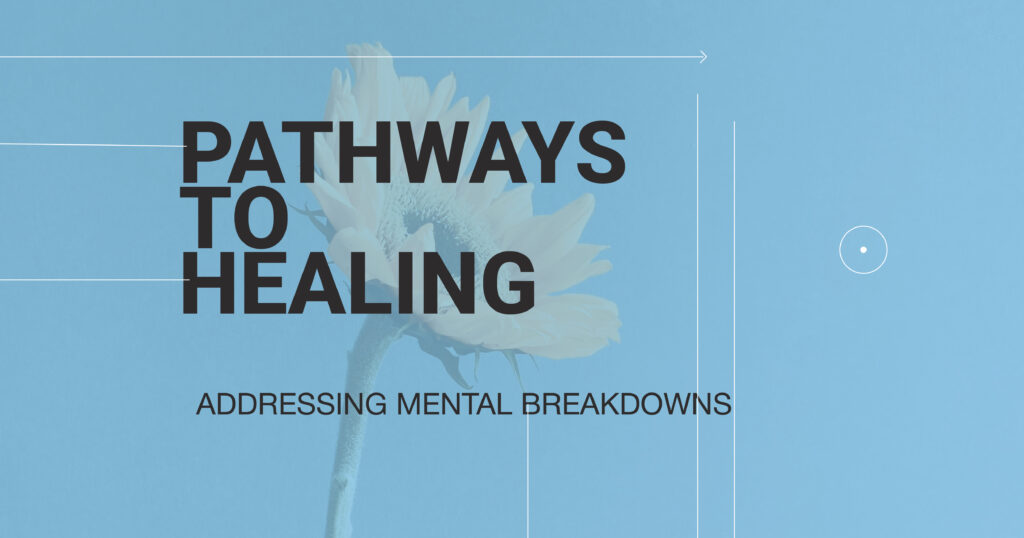In the dark areas of the mind where the shadows accumulate, mental breakdown may seem like the house of self falling down. The floor below your head is trembling, chambers of feeling are filled with acoustics of unbelief, and aisles of anxiety lead towards endless twilight. But this is where, in this shaky soil, there will be the chance of healing, reconstruction, and revitalization. By undergoing the kind treatment of mental breakdown, a combination of psychological therapy, mindfulness, emotional support, and stress control, you may start recovering your path back to light. This is your roadmap.
Understanding the Foundations of Psychological Therapy
Psychological therapy is the soft lightship amid stormy minds. It provides systematic, evidence-based approaches to the process of involving the raw material of your emotional life: thoughts, beliefs, and responses. With mental breakdowns, your only safe harbor is therapy, in which you can pull your distress, check the damage, and set sail afterward.
The Importance of Emotional Resilience in Everyday Life
The ability to bounce back is commonly defined as resilience – however – in reality, it is more bending and swaying without collapsing. Emotional resilience refers to the ability to stabilize when internal breakdown happens, such as when your system feels overwhelmed. You can use it to stabilize, take a break, breathe, and act, not respond. The stresses that come with daily life, relationship tensions, job stress, existential doubt, etc, are the cold winds that blow us. Resilience not only enables you to survive but also enables you to encounter them and change gears.
Effective Stress Management Techniques for a Balanced Mind
A mental breakdown can hardly occur in any kind of vacuum; it is usually preceded by uncontrolled chronic stress. Stress management forms the basis of treatment in mental breakdown. Techniques include:
- Making sleep and rest a priority: The nervous system cannot repair itself in a continuous state of being awake.
- Physical movement: Even a slow walk will tell the body: I am not dead yet, but still moving.
- Planning stress check-in: Pre-set 10 minutes a day to request: How am I feeling? What are those things I am carrying that I do not need?
- Boundaries, downtime: Refusing to say yes, giving up time, developing time of just being.
- Expressive discharge: Journalling, art, voice – whatever is the organ of emotion, once it is discharged instead of stagnating.
An Overview of Cognitive Behavioral Therapy and Its Benefits
One of the best therapeutic frameworks that has been studied and trusted to restore mental wellness in the event of a fractured mind is Cognitive Behavioral Therapy (CBT). The main principle is that your mind, your emotions, and your actions are in a circle. Having hurt one part, the other may come after. CBT helps you:
- Detect automatic thoughts (I am failing, I am unable to cope, there is no hope)
- Test results: Are they absolute truths? What else could be true?
- Think of alternatives, form balanced thoughts, and follow them.
- Learn coping behaviors that will break the downward spiral of breakdown.
Incorporating Mindfulness Techniques Into Your Daily Routine
Mindfulness is the soft anchor in the storm of a breakdown. It asks you to be in it–with your breath, your body, your experience of every moment, without judgment. When the mental breakdown strikes, your mind usually strikes back: I can not, it will ruin me, why is it happening to me, etc. Mindfulness says: “You’re here. Breathe. Notice.”

The daily routine may involve:
- Mini-pauses: a few times per day, pause, take a minute and a deep breath, label the feeling you have.
- Body-scan exercise: lying or sitting, focusing attention on the toes, feeling tension, and relaxing.
- Aware observation: In the course of a daily activity (washing hands, making tea), I just become involved in the process, not thinking of what to do next, and not reflecting on the past.
- Awareness walking: Walk slowly, ensuring that each footstep is in touch with the ground and that each breath is in touch with the step.
Crisis Intervention Strategies for Immediate Emotional Support
An emotional boost is crucial when a breakdown turns acute, i.e, when the feeling of overwhelm grows, the cries appear, the numbness engulfs, etc. Crisis intervention in the context of mental breakdown treatment may involve:
| Strategy | Description |
| Emergency Contacts | Contact a therapist, friend, or hotline when devastated. |
| Grounding Techniques | Follow the 5-4-3-2-1 rule: five things that you see, four things that you touch, three things that you hear, two things that you smell, and one thing that you taste. |
| Safe Space | Find a relaxing place with as little noise as possible and something that will soothe you. |
| Safety Plan | Name a written list of actions and people to contact in any case of symptom aggravation. |
| Professional Help | Seek advice from a therapist or crisis service in case of self-harm or suicidal ideation. |
Exploring Various Mental Wellness Programs for Long-Term Benefits
Breaking down is not only a crisis when it comes to healing but also one of sustainable, renewable healing. That is where mental wellness programs come in. They may involve outpatient therapy courses, group courses, online courses, retreats, and peer-support groups. The statistics inform us that only about 46% of individuals with a mental disease obtain professional treatment. The results of the study indicate that 75-80% of the recipients experience benefits.
In searching through programs, inquire:
- Does the program involve various modalities (therapy + mindfulness + lifestyle)?
- Does it fit with your situation and speed?
- Do there exist quantifiable outcomes?
- Are there support networks constructed?
The Role of Therapy in Building Healthy Coping Mechanisms
Therapy is the smiting and the smoldering of coping mechanisms construction. By working therapeutically, you develop:
- Awareness: What activates you, and what within you breaks when stressed?
- Skills: behavioral and mental means of reacting adaptively.
- Emotion regulation: realizing when you are slipping into despair and deciding on things that put you on the ground.
- Self-compassion is the inner voice that says, “You are human. You faltered. You will rebuild.”
- Adaptive habits: a new lifestyle that replaces old lifestyles that could have led to the breakdown.
Combining Therapeutic Approaches for Holistic Mental Health Care
The most powerful of healing is hardly linear or unique. The interventions of holistic care incorporate: CBT, mindfulness, stress management, crisis planning, and wellness programming. Within the framework of treating mental breakdowns, this would be one line of integration:
- Start with treatment in order to trace the antecedents that caused the breakdown.
- At the same time, stress-management and mindfulness activities should be adopted to stabilize everyday life.
- Scaffold and community long-term by building or joining a wellness program.
- Have a proactive system of self-help: peer network, self-routines, and a therapist.
- Revision and review the plan periodically, as your needs evolve.
Start Your Mental Wellness Journey with Clear Mind Treatment
When you are ready to start your healing process, reach out to Clear Mind Treatment. Our caring staff focuses on customized therapeutic courses, merging psychological therapy, mindfulness skills, crisis management, and a long-term wellness program to help you heal.
You do not need to take this walk by yourself. There are ways out, there is hope, and change is possible.

FAQs
What role does psychological therapy play in enhancing emotional resilience?
Psychological treatment enhances your emotional resilience by finding out the unhelpful thinking patterns, constructive responses, and enabling yourself to respond and not react. With time, such resilience reduces the severity of subsequent breakdowns and develops coping to withstand them.
How can mindfulness techniques be integrated into stress management for better emotional health?
Mindfulness practices, such as breath awareness, body scan, mindful pause, etc., become habitual, as do stress-management practices (sleep, boundaries, movement). They both change the system, bringing about the responsive calm of chronic tension.
What are the key benefits of cognitive behavioral therapy in promoting mental wellness?
CBT offers a systematic manner in which negative thinking and behavioral patterns are challenged and reformed to lead to breakdowns. It is useful in rebuilding mental wellness by substituting the reactive loops with the adaptive loop, enhancing mood, alleviating distress, and enhancing agency.
Which crisis intervention strategies are most effective for providing immediate emotional support?
Proven topics in crisis intervention practices are grounding exercises (such as 5-4-3-2-1), a written safety plan, the establishment of a safe physical environment, as well as knowing of named professional or peer contacts to access. These form a bridge in case of overwhelm, where it is threatening.
What should you look for in mental wellness programs to ensure long-term emotional stability?
Consider programs that have multi-modal approaches (therapy, mindfulness, and lifestyle), quantifiable outcomes, community support networks, customizable delivery (in-person/online), and responsiveness to your changing needs. Studies indicate that approximately 75-80% of therapy beneficiaries are improved.








